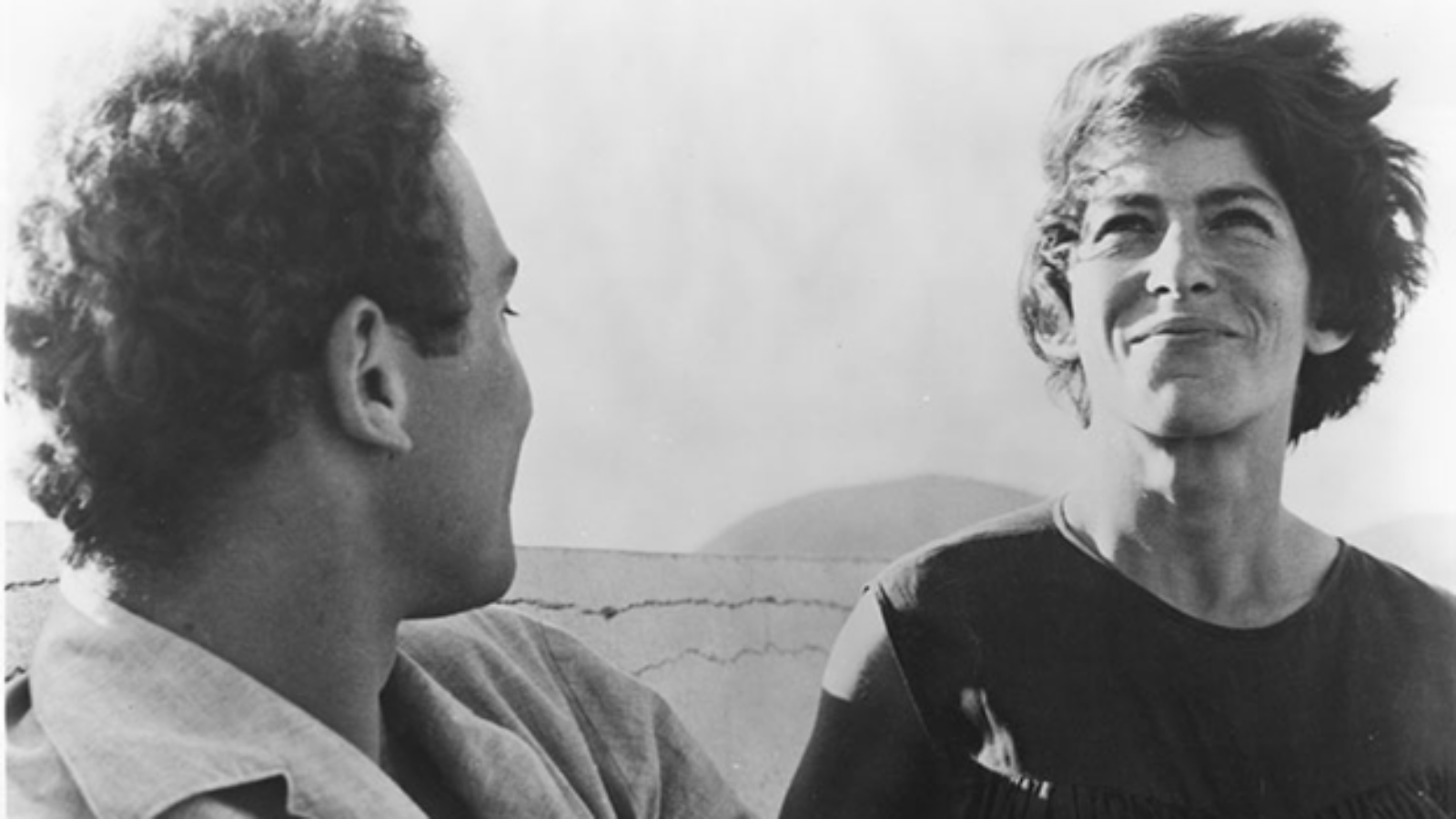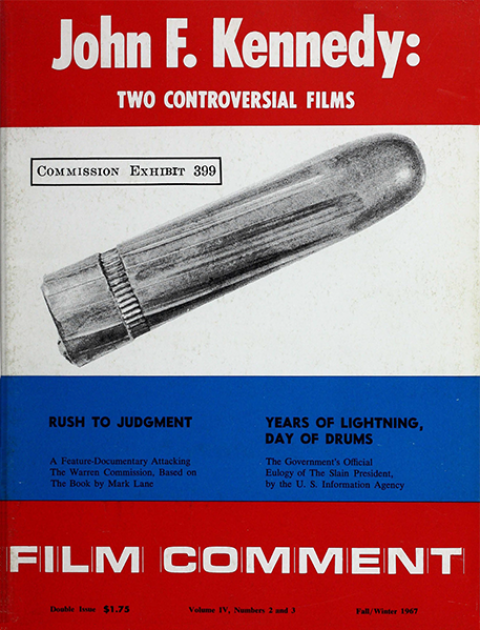By Jacqueline Veuve in the Fall-Winter 1967 Issue

Jean Rouch in conversation with Jacqueline Veuve
The dramas of Africa
Mme. Veuve lives in Lausanne with her husband and two children but frequently tours the European festivals as representative of the Festival Dei Popoli in Florence. She has worked at the Musee de l’Homme in Paris and has collaborated with Jean Rouch on a project of cataloging and analyzing ethnographic and sociological films; two of their catalogs have been for UNESCO. With Yves Yersin, she recently produced a 25-minute film on Swiss farm life, Le Panier a viande. Her interview with Rouch was translated by FILM COMMENT’s former publisher, Clara Hoover.

From the Fall-Winter 1967 Issue
Also in this issue
People say that you and Godard have had a bad influence on young filmmakers: ever since you began using unorthodox methods and materials, just about anyone thinks he is capable of picking up a camera and making a film without having first learned the craft.
I think that charge is idiotic. If people are, in fact, making films, and if we have enabled cinema to slip out of the stranglehold of ridiculous rules and industrial patterns that films have been buried in until now, then it’s a very good thing. But if we have opened the door to a lot of mediocrity because every amateur is making films, then what of it?
That there are now a lot of people making films today is good enough for me. Our influence is not a bad one when we have encouraged people to make films who were not making them before. We are not responsible for the fact that some of them have made bad films. Some of these people will one day make good ones!
What films using your improvisational methods have you done recently?
The first is a film made up of a series of sketches called Paris Vu Par . . . that is, Paris Seen By six directors: Claude Chabrol, Jean Douchet, Jean-Luc Godard, Jean-Daniel Pollet, Eric Rohmer, and myself. Each sketch takes place in a different sector of Paris. My film is the story of a suicide at the Northern Lines Railway station: La Gare du Nord.
The story is simple: a young girl argues with her husband because she lives near the Gare du Nord and her life is quite dull. She gets mad at him over breakfast and walks out. Suddenly she is almost run down at a street corner by a car driven by a young man who seems quite seductive. He invites her to run away with him, to live a wild adventure of love. He offers her everything she had criticized her husband for not giving her. But, either by good sense or by her bourgeois upbringing, she refuses to go with him, and the young man abruptly turns and jumps off the bridge on which they’ve been walking, onto the tracks below. The tone of the film comes from the fact that we live through the 20 minutes—without a visible cut—because the film is made in two 10-minute takes, with the splice hidden by a passage into a dark area. We live through everything leading up to the suicide: in a sense, we, too, become involved and, in a way, responsible for the suicide.
The second film I’ve finished recently is another sketch, this time one of four short films to be released together under the title The Fifteen Year-Old Widows. Each sketch takes place in a different country. They were directed by Teshigahara in Japan, Michel Brault in Canada, in Italy by Gian-Vittorio Baldi and in France by myself. With this film I am trying to get myself out of the dilemma of improvised reportage that you have to distort in order to edit. Here the dialogue has been written with the collaboration of the people who play the roles.
Do they play their own roles?
It’s their own experiences that serve as material for the film, but we have interchanged the roles. It’s the story of two girls: one who becomes delinquent and one who does not. But the role of the delinquent girl is played by the girl who is not, and vice versa. I have reversed the roles because I have learned by experience, in making Chronicle of a Summer, that being in a film can have a certain influence on a nonprofessional performer. It’s quite troubling to put people in a film, forcing them to play their own role—either because they feel guilty afterwards or because they become exhibitionists.
This film was censored, I believe.
Yes, I had to cut out the obscene words that the girls used and also—very curiously—the opinions the girls expressed about their families. Now, to me, this film was about the failure of urban families, but to hear the families condemned by the girls was intolerable to French censors—which shows that the problem is indeed a bad one when you can’t even talk about it.
Are you planning more films in Africa?
For quite a while I have thought it would be interesting to make films aimed both at African publics and at audiences of European researchers, to show them just how difficult the African problems are to solve. People are always talking about making basic teaching films, but when you ask the experts, you suddenly realize that no one knows what it is that they want to teach and no one even knows how to present better agricultural or animal husbandry techniques. We know very little, and yet that doesn’t stop us from going into Africa as if we held the key to all those problems!
However, if you take a very serious look at those problems, you discover that they are not at all what we thought. For example: I have done a film on the cultivation of millet [grass seed food]. Millet is at present one of the basic food-stuffs of those people who inhabit the savannah. And it so happens that it takes three to four months of work each year to grow millet. Now, the problem of improving the cultivation is relatively complex because the rainy season is very brief, and also there are problems of overpopulation that cause the rapid depletion of all agricultural products. But before trying to resolve these problems you must first know what they are. I thought it was necessary to know how the farmers themselves have attempted to solve their problems. The film I made tries to do nothing more than show how for generations people have solved, by themselves, a certain number of problems by drawing upon local beliefs and upon a philosophy of the relationship of man to nature.
If you like, I’m criticizing all of these experts who foist off on Africa their economic development theories and planning, without first knowing anything about what has gone on before. They are a little like these missionaries who think that they should Gospelize countries they call “pagan” because they aren’t Christian—as if there had never existed another religion before Christianity.
What African problems interest you most?
All of them. But at present one of the most interesting seems to be the attitude of the Africans themselves with regard to our western world: that is, their attempt to separate themselves more and more from our civilization, which they now consider out of date. For many Africans, we are the inventors of techniques, but unfortunately we don’t know how to use them.
Do you see a role for the cinema as an expression of African culture?
Although one cannot yet use the term African Cinema—there are only about five or six short African films in existence—it should nevertheless be pointed out that Africans have picked up the reins and that something is happening. Using non-African techniques, using easy-to-manipulate, improved equipment, Africans have begun to make films. We will soon see, coming out of Africa, films not based on written scenarios, but created on the spot with the camera and improvised by the actors. There is one film already called La Bague Du Roi Koda (The Ring of King Koda) created in this manner. A Mr. Lassam runs a small public film society in Niamey [Niger]. He shows both conventional and ethnographic films. One day his public said to him, “Why don’t we make a film with you?” So they invented a story, they shot it together, and they all looked at it together. In this way they produced a film—in this way a young African, who is almost illiterate, organized a film that became a sort of collective message from a group of people who are entirely illiterate. I think this shows a lot of promise.
The film was shown at a conference on African art held at Genes to prepare for the World Festival of Negro Art in Dakar during Easter, 1966. It was very well received—it brought a bit of fresh air. It was a good thing for young Africans educated in western schools and universities to see, all of a sudden, that what Europe had was not the only truth, that there were people back home in Africa who were bringing a sincere message straight out of the brushlands!
In the years to come, I believe that we shall witness the rise of something we never suspected: an Africa cinema culture. This is something that educated men have completely overlooked, for although there have been ethnographic films about Africa, it is a little sad that African ethnography has always been carried out only by people who come from another world.
For one of the dramas of Africa is this: the more the years go by, the more the gulf widens between the city and the brush, and the more that the African intellectuals are being separated from real African cultural traditions. So I think it’s a good thing that through audio-visual means young African intellectuals can realize that there are other things than Parisian sophistication and that there are also people on this earth whom we can call cultured—men who do not know how to read nor write but who have their own culture—an African culture, and it is in that culture that the young African will find his heritage, and not in ours!







